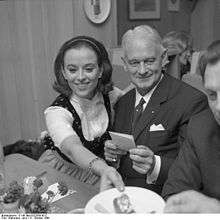Ingeborg Hallstein

Ingeborg Hallstein (born 23 May 1936 in Munich) is a German operatic coloratura soprano famed for the purity and range of her voice, which extended from the G-sharp below middle C to the B-flat more than three octaves above it.
She studied with her mother, Elisabeth Hallstein, and debuted at the opera house in Passau/Germany in 1957 as Musetta in Puccini's La bohème.
After engagements at the Theatre of Basel and the Staatstheater am Gärtnerplatz in Munich she made her Salzburg Festival debut in 1960 as Rosina in Mozart's La finta semplice. The same year she joined the Bavarian State Opera, a full member there from 1961 until 1973.
International career
In the following years, guest appearances led her to almost every important opera house in the world, including among others Deutsche Oper Berlin, Hamburg State Opera, Teatro La Fenice in Venice, and the Teatro Colón in Buenos Aires. She also sang at the Royal Opera House in London under Otto Klemperer and created one of her signature roles for the reopening of the Theater an der Wien under the baton of Herbert von Karajan: the Queen of the Night in Mozart's The Magic Flute.
Her repertoire of operatic roles reveals an artist who has an accurate and smart sense of her own musicianship. Her voice was well focused and she was capable of commanding dramatic phrasing and emotional expression. In opera she sang some of the most demanding roles in the coloratura Fach, e.g. Zerbinetta in Richard Strauss' Ariadne auf Naxos, Violetta in Verdi's La traviata, Zaide in Mozart's Zaide and the already mentioned Queen of the Night in The Magic Flute.
Apart from her appearances on the opera stage she devoted herself to the Lied, giving countless Lieder recitals in Germany and abroad.
Teaching
In 1979, she was appointed professor at the Music Conservatory in Würzburg. After initial doubts, teaching became her new passion and she decided to retire from stage and concentrate on the young talents. Hallstein taught in Würzburg until 2006. Today (as of 2009) she gives master classes in Germany and abroad and is a sought-after juror for international singing competitions.
Recordings, films and television
An exclusive contract with the renowned German record label Deutsche Grammophon resulted in numerous recordings of operas, operettas and songs. These recordings display an artist who had an uncanny sense of sophistication in terms of ornamentation and a fearless bravura approach to the most daring virtuoso pieces.
Besides her very successful stage career, she also achieved great popularity during the 1960s and 1970s when she appeared in many operetta films like Die Zirkusprinzessin or Wiener Blut, and musical shows broadcast on German television.
Awards
For her great services, among other things to the young talents, the Bayerische Kammersängerin received the Federal Cross of Merit in 1979, that order's First Class in 1996, and the Bavarian Order of Merit in 1999.
External links
- Ingeborg Hallstein at the Internet Movie Database (wrong date of birth)
- Vinyl Divas Hallstein Tribute Gallery